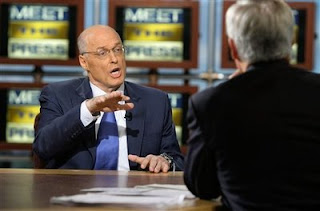- Substantial deregulation of financial markets took place under Bush
- This deregulation in large part caused the current financial crisis
Mr. Mankiw did taxpayers a service by wading into the debate over how to monitor these companies that have become repositories of enormous financial risk. Fannie in particular has marshaled its political troops to stop a bill in Congress that would transfer its regulation to the Treasury Department from a feckless unit of HUD. Fannie prefers feckless.
Specifically, "the subsidy creates a source of systemic risk for our financial system." This is because "the subsidy has allowed" the companies "to become gigantic," with their debt more than tripling to $2.2 trillion from 1995 to 2002."
Oh, but it gets better. "But especially notable is the support for Fannie and Freddie from liberals who normally detest corporate welfare. In this case, Congressman Barney Frank criticized Mr. Mankiw because he is worried about the tiny little matter of safety and soundness rather than "concern about housing."
Link to the article
For a problem as complicated as the financial crisis, it is not likely to be the only major cause. Looking at the evidence we see evidence that regulation was actually increased on Wall Street. The deregulation that did happen in the recent past probably prevented even worse consequences. One, Sarbanes-Oxley substantially increased the regulatory burden on companies. Under SarbOx, companies must mark certain assets to market. Even performing assets have been marked down substantially by banks. Since many of these assets are illiquid and difficult to value, they are often marked to a model rather than an actual market price(since a market price does not exist). Two, a substantial deregulation, the Gramm-Leech-Bliley Financial Services Modernization Act, enacted in 1999 under Clinton probably helped prevent an even worse disaster. This act repealed substantial parts of Glass-Steagall, and it allowed commercial banks and investment banks to combine. The universal banks have fared better in the recent crisis. I have a few more comments and links on another post.
I don't expect everyone to be an expert on regulation of financial markets. I certainly am not one myself. However, I do expect someone to actually have some facts about a situation before they argue a position. Remember, "Everyone is entitled to his own opinion, but not to his own fact"
I will continue to research this issue, and keep my readers updated.




